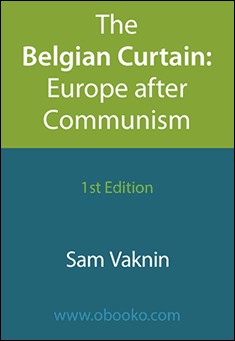The European Union, NATO, the euro, and central and eastern Europe after the fall of communism.
Excerpt:
Shifting geopolitical and geo-strategic realities in the wake of the September 11 atrocities have rendered this project all the more urgent. NATO - an erstwhile anti-Soviet military alliance is search of purpose - is gradually acquiring more political hues. Its remit has swelled to take in peacekeeping, regime change, and nation-building.
Led by the USA, it has expanded aggressively into central and northern Europe. It has institutionalized its relationships with the countries of the Balkan through the "Partnership for Peace" and with Russia through a recently established joint council. The Czech Republic, Poland, and Hungary - the eternal EU candidates - have full scale members of NATO for 3 years now.
The EU responded by feebly attempting to counter this worrisome imbalance of influence with a Common Foreign and Security Policy and a rapid deployment force. Still, NATO's chances of replacing the EU as the main continental political alliance are much higher than the EU's chances of substituting for NATO as the pre-eminent European military pact. the EU is hobbled by minuscule and decreasing defense spending by its mostly pacifistic members and by the backwardness of their armed forces.
That NATO, under America's thumb, and the vaguely anti-American EU are at cross-purposes emerged during the recent spat over the International Criminal Court. Countries, such as Romania, were asked to choose between NATO's position - immunity for American soldiers on international peacekeeping missions - and the EU's (no such thing). Finally - and typically - the EU backed down. But it was a close call and it cast in sharp relief the tensions inside the Atlantic partnership.
As far as the sole superpower is concerned, the strategic importance of western Europe has waned together with the threat posed by a dilapidated Russia. Both south Europe and its northern regions are emerging as pivotal. Airbases in Bulgaria are more useful in the fight against Iraq than airbases in Germany.
The affairs of Bosnia - with its al-Qaida's presence - are more pressing than those of France. Turkey and its borders with central Asia and the middle east is of far more concern to the USA than disintegrating Belgium. Russia, a potentially newfound ally, is more mission-critical than grumpy Germany.
The EU responded by feebly attempting to counter this worrisome imbalance of influence with a Common Foreign and Security Policy and a rapid deployment force. Still, NATO's chances of replacing the EU as the main continental political alliance are much higher than the EU's chances of substituting for NATO as the pre-eminent European military pact. the EU is hobbled by minuscule and decreasing defense spending by its mostly pacifistic members and by the backwardness of their armed forces.
That NATO, under America's thumb, and the vaguely anti-American EU are at cross-purposes emerged during the recent spat over the International Criminal Court. Countries, such as Romania, were asked to choose between NATO's position - immunity for American soldiers on international peacekeeping missions - and the EU's (no such thing). Finally - and typically - the EU backed down. But it was a close call and it cast in sharp relief the tensions inside the Atlantic partnership.
As far as the sole superpower is concerned, the strategic importance of western Europe has waned together with the threat posed by a dilapidated Russia. Both south Europe and its northern regions are emerging as pivotal. Airbases in Bulgaria are more useful in the fight against Iraq than airbases in Germany.
The affairs of Bosnia - with its al-Qaida's presence - are more pressing than those of France. Turkey and its borders with central Asia and the middle east is of far more concern to the USA than disintegrating Belgium. Russia, a potentially newfound ally, is more mission-critical than grumpy Germany.
































